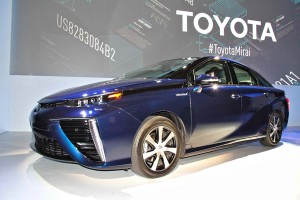
The Toyota Mirai hydrogen fuel-cell vehicle will hit showrooms in the U.S. this fall with free fuel to buyers.
Automakers have been providing a variety of incentives to entice buyers for decades, but Toyota’s trying to kill two birds with one stone when it comes to its new Mirai: free fuel.
The Mirai is a small four-door sedan that uses hydrogen fuel cell to generate the electricity that drives the car 300 miles on a full tank – a tank that takes just five minutes to refuel.
First, everyone likes free fuel, but with potential Mirai buyers it’s almost a must. While hydrogen may be the most abundant gas on Earth, it’s almost non-existent when talking about fueling up a vehicle. California, where most of the Mirais will be sold, has the largest number of public fueling stations with nine, but that number is expected to rise to 20 by the end of the year.
The California Energy Commission is investing $46.6 million to accelerate the development of hydrogen fueling stations. The cash infusion will add 28 new stations to the existing nine stations. There are another 17 sites in various stages of development, which would bring the total stations expected online in the next couple of years to 54. That commission’s goal is 100 stations.
So to entice the early adopters, which Toyota believes will be the first buyers for the $57,500 Mirai, they’ll get free fuel. Additionally, the Japanese maker is offering an around-the-clock “concierge,” roadside assistance and an eight-year, 100,000-mile warranty on the fuel cell.
The free fuel is a necessity for other reasons too, including the fact that a competitor, the Hyundai Tucson fuel cell vehicle, also offered free fuel for buyers. Add to that the fact that gas prices are at unexpected lows right now and pulling in buyers beyond those who are aficionados of fuel cell vehicles will be difficult.
With that in mind, Toyota’s sales goals are not outlandish. The maker sales of only about 200 this year – it will be in showrooms in October – and a total of 3,000 by the end of 2017. About a quarter will be snatched up by corporate or government fleets, but that’s an educated guess, according to Mark Oldenburg, Toyota’s national fleet marketing manager.
(Toyota launches Mirai sales in Japan. For more, Click Here.)
The company is also looking to raise the car’s profile in America and is planning to participate in Earth Day festivities in Washington D.C. later this week. It marks a return to the National Mall where 15 years ago it introduced another green vehicle to the world: the Toyota Prius, which is the best-selling hybrid in history.
(Click Here for details about Toyota’s hydrogen-filled plans to meet CAFE standards.)
“The Toyota Mirai represents a turning point in automotive history,” said Bob Carter, senior vice president, automotive operations, Toyota Motor Sales, U.S.A., Inc. “After more than 20 years of research and development, we are excited to bring Mirai to American driveways. Earth Day 2015 is a great platform to educate the public about hydrogen fuel cell technology and the potential of hydrogen as a future fuel.”
Beyond the celebration on the National Mall – and the offer of free fuel – Toyota plans to get out and talk to potential customers about fuel cell technology and hydrogen power, including events in New York and Los Angeles, and digital activities to converse with skeptics and advocates alike.
(To see more about the growing number of fuel-cell vehicles hitting the market, Click Here.)
Toyota will help New Yorkers mark Earth Day with an interactive display at Union Square Park on April 19. Hollywood celebrities will gather for laughs and an opportunity to learn about the Mirai during Waterkeeper Alliance’s “Keep it Clean,” a star-studded evening of comedy on April 22.

I believe that fuel cell powered cars will eventually replace all battery powered vehicles.
State and Federal government should NOT be funding refueling stations for hydrogen powered vehicles any more than they should be funding construction of gas or Diesel refueling stations. Private enterprise should be funding this – which may include the auto makers who benefit from selling these vehicles. In Germany you can buy propane and CNG at the same stations that sell petrol/Diesel. Adding hydrogen is a natural for these businesses.
No tax breaks should be given for EVs or hydrogen powered vehicles and both segments should be paying road taxes like all gas/Diesel powered vehicle operators.